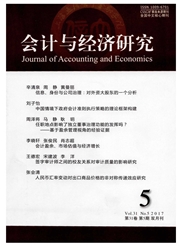

 中文摘要:
中文摘要:
围绕盈余管理和财务舞弊这一对相互联系又彼此区别的概念,以2003-2012年我国深沪两市被证券监管部门处罚的财务舞弊公司及其配对公司为样本,实证检验了盈余管理与财务舞弊的关联性。结果发现:舞弊当年盈余管理程度与财务舞弊可能性呈现微弱的正相关;公司以前年度盈余管理程度越大,当期发生财务舞弊的可能性越大;随着时间的推移,盈余管理向财务舞弊逐步演变。进一步综合主客观影响因素,将制度约束、环境变化、心理与行为等因素引入盈余管理与财务舞弊演变的理论框架,通过进一步检验,动态揭示了盈余管理演变为财务舞弊的三种机制,并结合舞弊动因GONE理论,构建了盈余管理与财务舞弊关系演变的理论模型。
 英文摘要:
英文摘要:
Focusing on earnings management and iinanclal iraud, which are interrelated but different concepts, this study aims to examine their relationship with the financial fraud companies punished by the Chinese securities regulatory departments or agencies from 2003 to 2012 and their matching firms. The results show that the degree of earnings management is slightly positive related to the possibility of financial fraud. The greater is the degree of earnings management in previous years, the greater is the possibility of financial fraud in the current period. Over time, earnings management evolves toward financial fraud. Further analysis takes account of factors such as institutional constraints, environmental constraints, psychology and behaviors into the theoretical framework of earnings management and financial fraud. By further hypotheses, three evolvement mechanisms from earnings management to financial fraud are dynamically revealed. Finally, the theoretical model of the relationship between earnings management and financial fraud is built with the GONE theory.
 同期刊论文项目
同期刊论文项目
 同项目期刊论文
同项目期刊论文
 期刊信息
期刊信息
